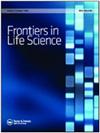夏、雨季无花果果实提取物的抗氧化和抑菌活性比较
Q1 Biochemistry, Genetics and Molecular Biology
引用次数: 18
摘要
根据季节栽培的不同,对无花果(Opuntia ficus-indica)果实提取物的抗氧化和抑菌活性进行了评价。采用不同的体外抗氧化方法对其抗氧化活性进行了评价,并对其总酚和总黄酮含量进行了测定。采用微孔板alamar蓝法测定其对结核分枝杆菌H37Rv (ATCC 27294)的抑菌活性。在抗氧化实验中,夏季甲醇提取物的抗氧化活性最高,清除2,2-二苯基-1-苦酰肼自由基的IC50最低。经Pearson相关系数分析,夏、雨季提取物与总酚、总黄酮含量呈显著相关。夏季OFI甲醇提取物对M. tuberculosis H37Rv具有较高的抑菌活性,最低抑菌浓度为50µg ml−1。本研究结果表明,OFI可能是抗氧化剂和抗结核分枝杆菌的重要来源。本文章由计算机程序翻译,如有差异,请以英文原文为准。
Comparative antioxidant and antimycobacterial activities of Opuntia ficus-indica fruit extracts from summer and rainy seasons
The antioxidant and antimycobacterial activities of Opuntia ficus-indica (OFI) fruit extracts were evaluated according to seasonal cultivation. The antioxidant activities of OFI extracts were assessed by different in vitro methods and the total phenolic and flavonoid contents were also examined. The antimycobacterial activity was measured against Mycobacterium tuberculosis strain H37Rv (ATCC 27294) by the microplate alamar blue assay method. In the antioxidant assay, methanol extracts of OFI in summer showed the highest antioxidant activity of all tested methods, and the lowest IC50 was observed in the 2,2-diphenyl-1-picrylhydrazyl radical scavenging assay. Pearson's correlation coefficient was evaluated and the results from the extracts of summer and rainy season OFI were significantly correlated with the total phenolic and flavonoid contents. The methanol extracts of OFI in summer showed a high level of antimycobacterial activity against M. tuberculosis H37Rv, with a minimum inhibitory concentration of 50 µg ml−1. The results of this study suggest that OFI could be an important source of antioxidants as well as antimycobacterials against M. tuberculosis.
求助全文
通过发布文献求助,成功后即可免费获取论文全文。
去求助
来源期刊

Frontiers in Life Science
MULTIDISCIPLINARY SCIENCES-
CiteScore
5.50
自引率
0.00%
发文量
0
期刊介绍:
Frontiers in Life Science publishes high quality and innovative research at the frontier of biology with an emphasis on interdisciplinary research. We particularly encourage manuscripts that lie at the interface of the life sciences and either the more quantitative sciences (including chemistry, physics, mathematics, and informatics) or the social sciences (philosophy, anthropology, sociology and epistemology). We believe that these various disciplines can all contribute to biological research and provide original insights to the most recurrent questions.
 求助内容:
求助内容: 应助结果提醒方式:
应助结果提醒方式:


